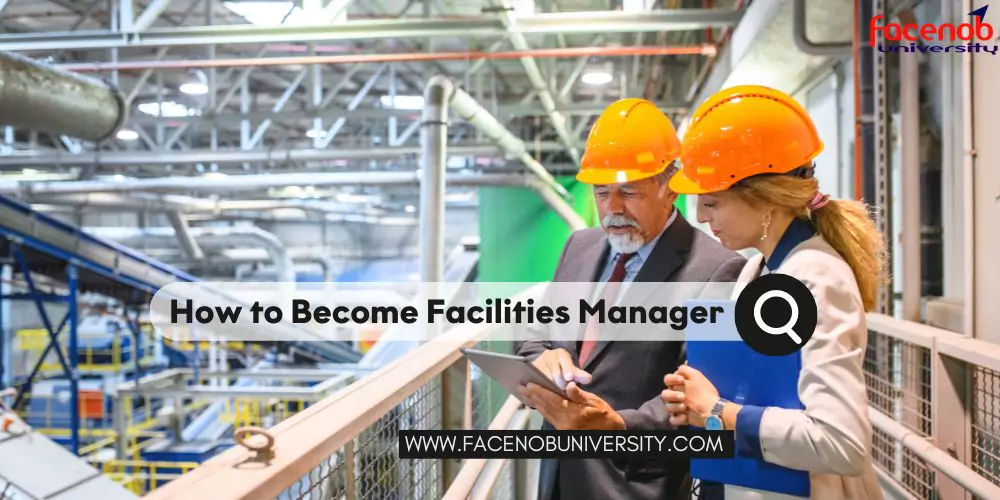How to Become a Facilities Manager

Introduction of Facilities Manager
Facilities Managers contribute to making increasingly dynamic workplaces that bring out the best in their users by managing services and processes that help firms run smoothly.
Similar Job Titles
- Business Manager
- Operations Manager

Typical Job Responsibilities
What do Facility Managers do?
A Facility Manager would typically need to:
- Oversee the security, upkeep, and services of work facilities to ensure they satisfy the employer’s demands.
- Control and manage the operations and maintenance of buildings, grounds, equipment, and supplies.
- Contribute significantly to long-term planning and the development of individual programme budgets
- Planned and coordinate important services like reception, security, maintenance, mail, archiving, cleaning, catering, garbage disposal, and recycling.
- Inspect air conditioning and heating systems, as well as the exterior of buildings; implement effective energy and environmental management
- Ensure that all buildings, facilities, and personnel comply with current legislation and health and safety rules.
- Supervise remodelling projects to increase efficiency or to comply with regulations, as well as environmental, health, and security standards.
- Prepare the paperwork needed to issue tenders to contractors; analyse and evaluate the price-quality ratio for critical items or services.
- Monitor and coordinate the work of contractors or employees to ensure that it follows predetermined criteria.
- Direct employees, such as groundskeepers, janitors and building cleaners, and general maintenance and repair workers
- Utilise performance management techniques to monitor and demonstrate adherence to predefined service levels.
- Plan for future growth by strategic business objectives; investigate additional premises for availability and suitability.
- Plan for the most efficient allocation and utilisation of space and resources for new buildings or reconfiguration of existing facilities.
- Manage and lead changes and improvements while ensuring that primary tasks are not disrupted.
- Respond to emergencies as they arise, such as a burglary or sudden flooding of a basement, and deal with the consequences positively.
- Complete and accurately record all maintenance actions in a functional management database.
Standard Work Environment
Facility Managers typically operate from their offices, but they must oversee staff activities both inside and outside the building. They may be required to travel to other facilities while being supervised.
Work Schedule
Full-time work schedules necessitate working more than 40 hours per week, particularly to fulfil project deadlines or cover emergencies, in which case you will frequently be on call. You may be required to work in shifts during 24-hour operations.
Employers
Finding a new job may appear difficult. Facility Managers can improve their job search by soliciting referrals from their network, contacting firms directly, using job search platforms, attending job fairs, leveraging social media, and contacting staffing agencies. Although major businesses provide direct employment, you can also find work with huge contracting organisations that work for a variety of clients. Some Facilities Managers work on long-term contracts, while others work on short-term contracts to accomplish specific projects.
Facility managers are generally employed by:
- Business Consultancies
- Facilities Management Providers
- Industrial Facilities & Factories
- Large Public Buildings, Including Museums & Libraries
- Local Councils
- Offices
- Prisons
- Private & Government Hospitals
- Schools, Colleges & Universities
- Scientific Laboratories
- Shops & Business Parks
- Specialist Facilities Management Consultancies
- Stadiums
- Finance & Insurance Sectors
- The Construction & Civil Engineering Industry
- IT Sector
- Manufacturing & Engineering Sectors
- The Transportation Industry
Unions / Professional Organizations
Professional associations and organisations, such as The International Facility Management Association (IFMA), are essential for Facilities Managers who want to further their professional growth or interact with other professionals in their industry or trade. Membership in one or more of these organisations adds value to your CV while strengthening your credentials and qualifications.
Workplace Challenges
- Controlling costs while managing the facilities effectively; doing more with less
- Extending the life of resources
- Keeping accurate records
- Choosing the right vendors/contractors/suppliers/staff
- Lack of work-life balance due to irregular work schedules and the need to manage more than one facility
- Successful execution of long-term projects which require flexibility or relocation
- Stress due to insufficient funds and emergencies
Suggested Work Experience
Candidates who do not have a degree or HND can become Facilities Managers if they have the necessary combination of skills and experience from previous positions in management, administration, hospitality, construction, building services, engineering or accounting. Some facilities management businesses may accept suitable work-based NVQs (National Vocational Qualifications).
You can go from assistant manager to general manager by focusing on one operation, such as cleaning, catering, or maintenance. You can also start as a project support team member and work your way up to team leader for a portion of a facility’s project before getting promoted to Facilities Manager.
Previous employment as a general maintenance and repair worker or cost estimator will highlight your administrative and leadership talents in business operations, project management, and building maintenance. An industrial placement year should assist you gain experience in administration, building, construction, engineering, and management.
Prospective Facilities Managers can improve their interpersonal skills and ability to work with a diverse range of individuals by working in the hospitality business. To demonstrate your devotion to course providers and future employers, read about the profession and interview or job shadow specialists in facilities management.
Recommended Qualifications
A foundation degree or HND (Higher National Diploma) in facilities management, building and built environment, business studies, or management could lead to an entry-level position as a Facilities Manager.
A bachelor’s degree in building management, business studies, construction, engineering & building services engineering, facilities management, hospitality, finance, accounting, management, surveying, or estate management, on the other hand, will be more useful.
A master’s degree in facilities management, finance, or business administration is not required, however, certain employers may need it.
Furthermore, courses in consumer psychology, organisational behaviour, and those specific to the healthcare or telecommunications industries would help you stand out in a competitive job market.
In high school, concentrate on business subjects, accounting, mathematics, and psychology.
Certifications, Licenses and Registration
Facility management certification, records and information management certification, and information governance certification establish a facility manager’s proficiency in a certain skill set, often by work experience, training, and test.
Certification from a reputable and objective body will help you stand out in a competitive job market and can result in a large salary premium of up to 18%.
By including a Code of Ethics, successful certification programmes defend the public welfare.
To travel between facilities, you must have a full driving licence.
Projected Career Map of Facilities Manager
Performance, experience, and the acquisition of professional qualifications drive the career growth of Facilities Managers in major firms; they may advance to Area, Regional, and Sector Management positions before becoming Directors. Smaller firms have fewer opportunities for promotion to management roles.
After gaining extensive experience as a Facilities Manager, you may wish to specialise in consulting, take on abroad assignments, or establish your firm.
Job Prospects
Candidates with post-secondary education and facilities management certification, as well as associated work experience, have the highest job prospects.
Beneficial Professional Development
CPD will assist active Facility Managers in developing personal skills and proficiency through work-based learning, professional activity, and other means.
Whether traditional schooling or self-directed learning is used.
CPD is also required for the regular renewal of desirable certification in facilities management, as well as the strengthening of analytical, communication, and leadership abilities, all of which facilitate job advancement.
On-the-job training under the supervision of experienced colleagues, as well as part-time study for higher educational qualifications in facilities management, administration, or building management, will assist newcomers in learning the trade.
Larger firms provide coveted graduate development programmes to deserving candidates, with the option to specialise in a certain profession such as security or retail.
Conclusion of Facilities Manager
Competent Facilities Managers recognise viable prospects and guide their teams down unfamiliar pathways to develop constantly evolving workplaces that assist firms in meeting their business objectives.
Advice from the Wise
Before starting any job, determine the most efficient and cost-effective strategy to do it. Understand and stay up to date with new technology.
Explore Also: How to Become an Executive Assistant
